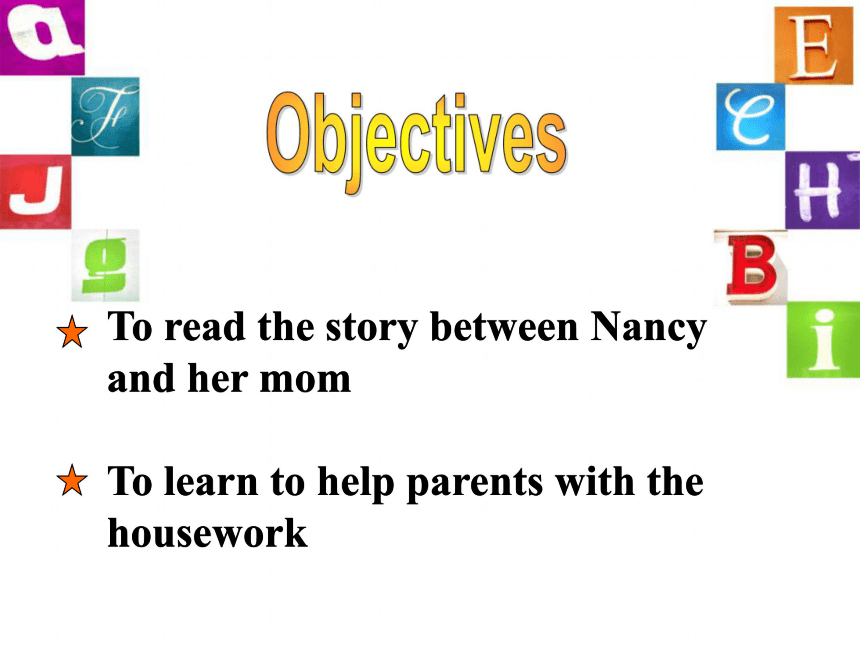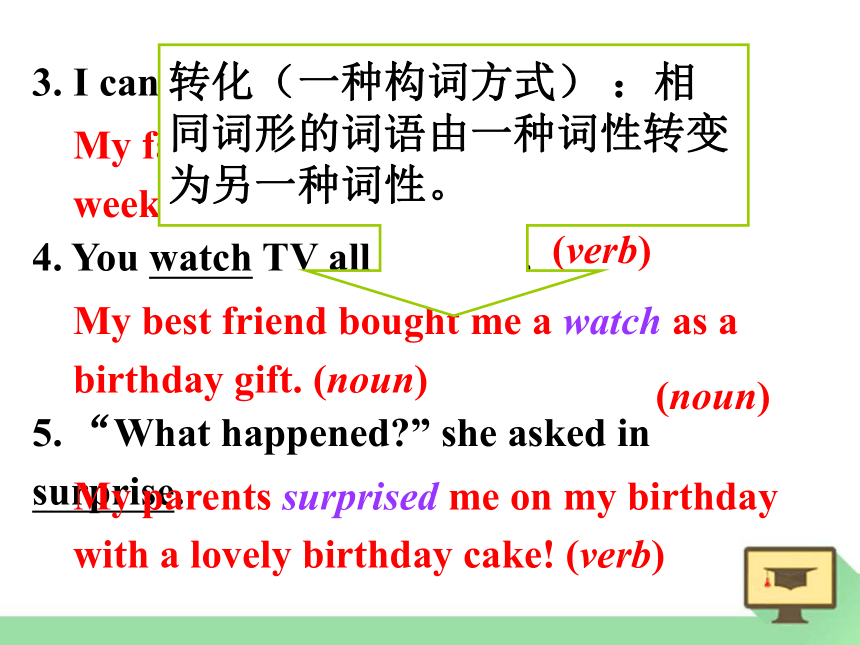Unit 3 Could you please clean your room Section A(3a-3c)课件(40ppt)
文档属性
| 名称 | Unit 3 Could you please clean your room Section A(3a-3c)课件(40ppt) |  | |
| 格式 | zip | ||
| 文件大小 | 1.9MB | ||
| 资源类型 | 教案 | ||
| 版本资源 | 人教新目标(Go for it)版 | ||
| 科目 | 英语 | ||
| 更新时间 | 2018-01-11 22:32:08 | ||
图片预览












文档简介
课件40张PPT。Unit 3Unit 3Could you please clean your room?Section A
3a-3ctake out the trash
do chores
do the dishes
sweep the floor
make dinner
make the bed
fold the clothes A: Could you please make sentences with
these phrases in the past tense?
B: Sure. I did some chores.clean the living room
help out with
at least
finish doing sth.
be back from shopping
see this mess
mother cleanRevisionA: What kind of chores did you do last weekend?
B: I did the dishes.Talk about the housework.Discussionthrow
all the time
neither
shirt
as soon asv. 扔;掷
频繁;反复
adv. 也不
pron. 两者都不
n. 衬衫
一……就……;尽快To read the story between Nancy and her mom
To learn to help parents with the houseworkObjectivesRead the story and answer the questions.
1. Did Nancy do any housework that day?
2. Why was Nancy’s mom angry with her?
3. Did they solve the problem? How?No, she didn’t.
Because she didn’t do any housework.
Yes, they did. They need to share the housework.3aRead the story again and the sentences below. Write down the sentences from the reading that mean the same thing.1. Neither of us did any housework for a week.
For one week, she did not do any
housework and neither did I.3b2. My mom came over as soon as I sat down in front of the TV.
The minute I sat down in front of the TV, my mom came over.
3. You’re tired, but I’m tired, too.
Well, I work all day at school, too! I’m just as tired as you are!Decide whether the underlined words in the sentences are verbs or nouns. Then write another sentence using the underlined word in the other form. Could you take the dog for a walk? (noun)
2. Could I watch one show first?I walked home from school. (verb)
Could you please show me your new
book? (verb)3c(noun)3. I can’t work all day.
4. You watch TV all the time.
5. “What happened?” she asked in surprise.My father has a lot of work to do this weekend. (noun)
My best friend bought me a watch as a birthday gift. (noun)
My parents surprised me on my birthday with a lovely birthday cake! (verb)(verb)(verb)(noun)转化(一种构词方式) :相同词形的词语由一种词性转变为另一种词性。Fill in the blanks according to the passage. Last month, our dog welcomed me ________ I came home from school. He wanted a walk, ________ I was too tired. I ___________ my bag and went to the living room. The ________ I sat down in front of the TV, my mom came over.
“______ you please take the dog for a walk?” she asked.
“Could I watch one show first?” I asked.
“No!” she ________ angrily. “You watch TV all the time and never help out around the house! I can’t work all day and do housework all evening.”whenbutminuterepliedthrew downCould “ Well, I work all day at school, too! I’m just ______ tired as you are!” I shouted back.
My mom did not say anything and walked away. For one week, she did not do any housework and _______ did I. Finally, I could not find a clean dish or a clean shirt.
The next day, my mom came home from work _____ find the house clean and tidy.
“What happened?” She asked in surprise.
“I’m sorry, Mom. I finally understand _____ we need to share the housework to have a clean
and comfortable home,” I replied.asneithertothatWork in groups. Role-play the conversation. Then present in the class.
Student A read the text.
Student B plays the role of “mom”. Student C plays the role of “Nancy”.Group work1. The minute I sat down in front of the
TV, my mom came over.
我刚一坐到电视前面,我妈就走了过来。
the minute相当于as soon as,?意为“一……
就……”。如:
The minute / As soon as I came home, I
turned on the TV.【运用】完成句子,每空词数不限。
他一来,我就告诉他这个消息。
I’ll tell him the news ___________
__________ he comes.the minute/as soon as 2. You watch TV all the time and ...
all the time(在该段时间内)一直;向来,一向;时时刻刻;每时每刻
e.g. I’ve kept on thinking about that all the
time.
我一直惦记着这件事。
Follow that man and keep him in sight
all the time.
跟着那个人, 一直盯着他。[拓展]
against time 抢时间;尽快
ahead of time 提前
at one time 一度;过去曾经
at the same time 同时
at times 有时候
take (one’s) time 慢慢来;不着急
for a time 一时;一下子
from time to time 不时地
have a good / hard time 过得愉快 / 艰难
in no time 马上;立即;一会儿
in time 及时地
on time 按时;准时 [即学即练] 选择以上time短语完成下列句子。
1) —I am afraid I can’t return the book to you
before Friday.
—_________________.
2) The flowers were so lovely that they were
sold ___________.
3) Having been ill in bed for nearly a month, he
________________ passing the exam.
4) If the train is _______ it should arrive at
three o’clock exactly.take your timein no timehad a hard time on time 5) Whenever I have an appointment I always
like to arrive a little ____________.
6) I keep practising and I’m improving
___________. ahead of timeall the time 3. I’m just as tired as you are!
as ... as意为 “和……一样” ,表同级比较。要注意第一个as为副词,第二个as为连词。基本结构为:as +?adj./?adv.?+ as。
e.g. This?film?is?as?interesting?as?that?one.
这部电影和那部电影一样有趣。
Your?pen?writes?as?smoothly?as?mine.
你的钢笔书写起来和我的一样流畅。否定形式为 “not as/so + adj./adv. + as”。
e.g. He didn’t act as well as you.
他表现得不如你好。4. For one week, she did not do any housework and neither did I.
neither用作副词,作“也不”解释,放在句首,表示前面否定的内容也适用于另一个人或物,采用部分倒装。此时也可用nor替换neither使用。e.g.
— I?don’t?like?this?dress.?
我不喜欢这件连衣裙。
— Neither?/?Nor?do?I.?我也不喜欢。
注意:neither之后的主语要置于助动词或系动词之后。neither用作代词,表示“两者都不,双方均不”。
e.g. He?answered?neither?of?the?letters.?
他两封信都没回。
— Which?one?would?you?like??
你喜欢哪一个?
— Neither.?
两个都不喜欢。?neither ... nor ...意为“既不……也不……”,用于连接两个并列成分。当连接两个并列主语时,谓语动词通常要与nor后面的代词或名词在人称和数上保持一致。如:
We had neither money nor food.
Neither Jim nor I am right.1) also是正式的用语,语气较庄重。常放在句中,行为动词之前,连系动词之后; 如有助动词或情态动词,一般放在助动词或情态动词之后。例如:
Peter also has two brothers.
彼得也有两个兄弟。 also, too, either, neither的用法I am also a student.
我也是一名学生。
Mrs. Green can also sing the song in Chinese.
格林夫人也能用汉语唱这首歌。 2) too是普通用词,多用于口语,语气较随便。在肯定句中,放在句末。例如:
I’m in Row 1, too.
我也在第一排。
注意:also和too一般都用于肯定句,很少用于否定句。 3) either 表示“也”时,一般只用于否定
句,且置于句末。例如:
I don’t know him. Tom doesn’t know
him, either.
我不认识他,汤姆也不认识他。
If you don’t go there, he won’t go
there, either.
如果你不去那儿,他也不会去那儿。
注意:either本身没有否定的意义。所 以多与not连用。 4) neither表示“两个都不”,它作主语
时,谓语动词常用单数。例如:
Neither of you can do it.
你们两个都不能做这件事。【运用】Ⅰ.?单项选择。
1) I could speak _____ French _____ Chinese, but luckily I could talk with them in English. (2015?湖北十堰)
A. both; and?? ???? B. neither; nor??
C. either; or?? ????? D. not only; but also
2) Neither the headmaster nor the teachers _____ take a vacation next week.
A. were going to ? ? ?B. is going to
C. was going to????? D. are going toBD3) —I don’t understand the story in the
new unit. What about you, Bob?
—______. (2015?湖北恩施)
A. Neither I do??????? ????
B. Neither do I?
C. So do I?BⅡ.?完成句子,每空一词。
1)?他们俩都不喜欢这个节目。
_______ _____ _____ _________ this program.
2) 两个答案都不对。
_______ _______ is right.Neither of them likes / likeNeither answerwatch this show 看这个表演
come home from school 放学回到家
sit down in front of the TV 坐在电视机前
take the dog for a walk 遛狗
all the time 频繁;反复
walk away 走开
as ... as ... 像……一样……
the next day 第二天
in surprise 惊讶地
throw down 扔下 本课小结根据汉语意思及括号内所给英文提示语,将
下列句子翻译成英语。
1.?你不可以频繁借吉尔(Jill)的电脑。(all the
time)
________________________________________
2.?我们一做完作业就可以外出娱乐了。?(the minute)
________________________________________
________________________________________You can’t borrow Jill’s computer all the time.The minute we finish (doing) our homework, we can go out.3.?琳达(Linda)惊讶地看着我。?(in surprise)
________________________________________
4.?这件毛衣和那件一样便宜。? (as ... as )
________________________________________
5.?妈妈,你可以带我去散步吗??(take ... for a walk)
________________________________________Linda looked at me in surprise.This sweater is as cheap as that one.Mom, could you take me for a walk?Make a conversation between your mother and you, using the sentence pattern “Could you please …?
Could I …?”
3a-3ctake out the trash
do chores
do the dishes
sweep the floor
make dinner
make the bed
fold the clothes A: Could you please make sentences with
these phrases in the past tense?
B: Sure. I did some chores.clean the living room
help out with
at least
finish doing sth.
be back from shopping
see this mess
mother cleanRevisionA: What kind of chores did you do last weekend?
B: I did the dishes.Talk about the housework.Discussionthrow
all the time
neither
shirt
as soon asv. 扔;掷
频繁;反复
adv. 也不
pron. 两者都不
n. 衬衫
一……就……;尽快To read the story between Nancy and her mom
To learn to help parents with the houseworkObjectivesRead the story and answer the questions.
1. Did Nancy do any housework that day?
2. Why was Nancy’s mom angry with her?
3. Did they solve the problem? How?No, she didn’t.
Because she didn’t do any housework.
Yes, they did. They need to share the housework.3aRead the story again and the sentences below. Write down the sentences from the reading that mean the same thing.1. Neither of us did any housework for a week.
For one week, she did not do any
housework and neither did I.3b2. My mom came over as soon as I sat down in front of the TV.
The minute I sat down in front of the TV, my mom came over.
3. You’re tired, but I’m tired, too.
Well, I work all day at school, too! I’m just as tired as you are!Decide whether the underlined words in the sentences are verbs or nouns. Then write another sentence using the underlined word in the other form. Could you take the dog for a walk? (noun)
2. Could I watch one show first?I walked home from school. (verb)
Could you please show me your new
book? (verb)3c(noun)3. I can’t work all day.
4. You watch TV all the time.
5. “What happened?” she asked in surprise.My father has a lot of work to do this weekend. (noun)
My best friend bought me a watch as a birthday gift. (noun)
My parents surprised me on my birthday with a lovely birthday cake! (verb)(verb)(verb)(noun)转化(一种构词方式) :相同词形的词语由一种词性转变为另一种词性。Fill in the blanks according to the passage. Last month, our dog welcomed me ________ I came home from school. He wanted a walk, ________ I was too tired. I ___________ my bag and went to the living room. The ________ I sat down in front of the TV, my mom came over.
“______ you please take the dog for a walk?” she asked.
“Could I watch one show first?” I asked.
“No!” she ________ angrily. “You watch TV all the time and never help out around the house! I can’t work all day and do housework all evening.”whenbutminuterepliedthrew downCould “ Well, I work all day at school, too! I’m just ______ tired as you are!” I shouted back.
My mom did not say anything and walked away. For one week, she did not do any housework and _______ did I. Finally, I could not find a clean dish or a clean shirt.
The next day, my mom came home from work _____ find the house clean and tidy.
“What happened?” She asked in surprise.
“I’m sorry, Mom. I finally understand _____ we need to share the housework to have a clean
and comfortable home,” I replied.asneithertothatWork in groups. Role-play the conversation. Then present in the class.
Student A read the text.
Student B plays the role of “mom”. Student C plays the role of “Nancy”.Group work1. The minute I sat down in front of the
TV, my mom came over.
我刚一坐到电视前面,我妈就走了过来。
the minute相当于as soon as,?意为“一……
就……”。如:
The minute / As soon as I came home, I
turned on the TV.【运用】完成句子,每空词数不限。
他一来,我就告诉他这个消息。
I’ll tell him the news ___________
__________ he comes.the minute/as soon as 2. You watch TV all the time and ...
all the time(在该段时间内)一直;向来,一向;时时刻刻;每时每刻
e.g. I’ve kept on thinking about that all the
time.
我一直惦记着这件事。
Follow that man and keep him in sight
all the time.
跟着那个人, 一直盯着他。[拓展]
against time 抢时间;尽快
ahead of time 提前
at one time 一度;过去曾经
at the same time 同时
at times 有时候
take (one’s) time 慢慢来;不着急
for a time 一时;一下子
from time to time 不时地
have a good / hard time 过得愉快 / 艰难
in no time 马上;立即;一会儿
in time 及时地
on time 按时;准时 [即学即练] 选择以上time短语完成下列句子。
1) —I am afraid I can’t return the book to you
before Friday.
—_________________.
2) The flowers were so lovely that they were
sold ___________.
3) Having been ill in bed for nearly a month, he
________________ passing the exam.
4) If the train is _______ it should arrive at
three o’clock exactly.take your timein no timehad a hard time on time 5) Whenever I have an appointment I always
like to arrive a little ____________.
6) I keep practising and I’m improving
___________. ahead of timeall the time 3. I’m just as tired as you are!
as ... as意为 “和……一样” ,表同级比较。要注意第一个as为副词,第二个as为连词。基本结构为:as +?adj./?adv.?+ as。
e.g. This?film?is?as?interesting?as?that?one.
这部电影和那部电影一样有趣。
Your?pen?writes?as?smoothly?as?mine.
你的钢笔书写起来和我的一样流畅。否定形式为 “not as/so + adj./adv. + as”。
e.g. He didn’t act as well as you.
他表现得不如你好。4. For one week, she did not do any housework and neither did I.
neither用作副词,作“也不”解释,放在句首,表示前面否定的内容也适用于另一个人或物,采用部分倒装。此时也可用nor替换neither使用。e.g.
— I?don’t?like?this?dress.?
我不喜欢这件连衣裙。
— Neither?/?Nor?do?I.?我也不喜欢。
注意:neither之后的主语要置于助动词或系动词之后。neither用作代词,表示“两者都不,双方均不”。
e.g. He?answered?neither?of?the?letters.?
他两封信都没回。
— Which?one?would?you?like??
你喜欢哪一个?
— Neither.?
两个都不喜欢。?neither ... nor ...意为“既不……也不……”,用于连接两个并列成分。当连接两个并列主语时,谓语动词通常要与nor后面的代词或名词在人称和数上保持一致。如:
We had neither money nor food.
Neither Jim nor I am right.1) also是正式的用语,语气较庄重。常放在句中,行为动词之前,连系动词之后; 如有助动词或情态动词,一般放在助动词或情态动词之后。例如:
Peter also has two brothers.
彼得也有两个兄弟。 also, too, either, neither的用法I am also a student.
我也是一名学生。
Mrs. Green can also sing the song in Chinese.
格林夫人也能用汉语唱这首歌。 2) too是普通用词,多用于口语,语气较随便。在肯定句中,放在句末。例如:
I’m in Row 1, too.
我也在第一排。
注意:also和too一般都用于肯定句,很少用于否定句。 3) either 表示“也”时,一般只用于否定
句,且置于句末。例如:
I don’t know him. Tom doesn’t know
him, either.
我不认识他,汤姆也不认识他。
If you don’t go there, he won’t go
there, either.
如果你不去那儿,他也不会去那儿。
注意:either本身没有否定的意义。所 以多与not连用。 4) neither表示“两个都不”,它作主语
时,谓语动词常用单数。例如:
Neither of you can do it.
你们两个都不能做这件事。【运用】Ⅰ.?单项选择。
1) I could speak _____ French _____ Chinese, but luckily I could talk with them in English. (2015?湖北十堰)
A. both; and?? ???? B. neither; nor??
C. either; or?? ????? D. not only; but also
2) Neither the headmaster nor the teachers _____ take a vacation next week.
A. were going to ? ? ?B. is going to
C. was going to????? D. are going toBD3) —I don’t understand the story in the
new unit. What about you, Bob?
—______. (2015?湖北恩施)
A. Neither I do??????? ????
B. Neither do I?
C. So do I?BⅡ.?完成句子,每空一词。
1)?他们俩都不喜欢这个节目。
_______ _____ _____ _________ this program.
2) 两个答案都不对。
_______ _______ is right.Neither of them likes / likeNeither answerwatch this show 看这个表演
come home from school 放学回到家
sit down in front of the TV 坐在电视机前
take the dog for a walk 遛狗
all the time 频繁;反复
walk away 走开
as ... as ... 像……一样……
the next day 第二天
in surprise 惊讶地
throw down 扔下 本课小结根据汉语意思及括号内所给英文提示语,将
下列句子翻译成英语。
1.?你不可以频繁借吉尔(Jill)的电脑。(all the
time)
________________________________________
2.?我们一做完作业就可以外出娱乐了。?(the minute)
________________________________________
________________________________________You can’t borrow Jill’s computer all the time.The minute we finish (doing) our homework, we can go out.3.?琳达(Linda)惊讶地看着我。?(in surprise)
________________________________________
4.?这件毛衣和那件一样便宜。? (as ... as )
________________________________________
5.?妈妈,你可以带我去散步吗??(take ... for a walk)
________________________________________Linda looked at me in surprise.This sweater is as cheap as that one.Mom, could you take me for a walk?Make a conversation between your mother and you, using the sentence pattern “Could you please …?
Could I …?”
同课章节目录
- Unit 1 What's the matter?
- Section A
- Section B
- Unit 2 I'll help to clean up the city parks.
- Section A
- Section B
- Unit 3 Could you please clean your room?
- Section A
- Section B
- Unit 4 Why don't you talk to your parents?
- Section A
- Section B
- Unit 5 What were you doing when the rainstorm came
- Section A
- Section B
- Review of Units 1-5
- Unit 6 An old man tried to move the mountains.
- Section A
- Section B
- Unit 7 What's the highest mountain in the world?
- Section A
- Section B
- Unit 8 Have you read Treasure Island yet?
- Section A
- Section B
- Unit 9 Have you ever been to a museum?
- Section A
- Section B
- Unit 10 I've had this bike for three years.
- Section A
- Section B
